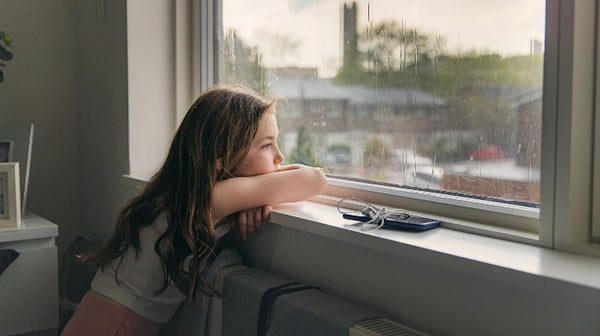Anxiety in children
Being worried is a normal part of being human. Children - with all their wonderful imagination skills but not yet fully formed reasoning skills - experience many worries as they go through life.
In 2020, one in six (16%) children aged 5 to 16 years were identified as having a probable mental disorder. It can be difficult as a parent to watch your child be worried, but this is an essential part of learning about feelings and how to manage them.

You might also be interested in...
1. The most common anxieties in children
What children worry about changes as they get older. This is because their brain is constantly developing and as they grow, children are exposed to new information about the world. The image below shows the most common types of anxiety by age. While most children will follow this pattern, some may have a varying journey through the stages.

At 0-12 months, babies are entirely reliant on their caregiver to live and fear separation from them. They also fear strangers, loud noises, bright lights and sudden movements. As babies progress towards ages 2-4, they can’t distinguish reality from fantasy and therefore fear things like monsters, shadows and hidden figures.
For 5-7 year olds, children become more aware of the outside world and so their anxieties tend to be about bad things happening such as natural disasters or their home being burgled. Being anxious around animals can peak at this age too, as children fear being hurt by them. As children get older, death can also be a source of anxiety around the ages of 8-11. This is also an age where school can trigger a number of anxieties such as academic performance, friendships, and doing well compared to others.
At 12-18 years, peer groups become an essential part of a teenager’s journey towards adulthood, so fitting in and being accepted are important to them. Therefore, teenagers feel anxious about their body image, social skills, and school performance. The Good Childhood Report (2021) found that children aged 10-15 were most worried about getting good grades, finding a job, and having enough money so they can have the future they want.
2. The effects of anxiety in children
Every child will experience anxiety at some point. It is an essential part of the growing up process and helps children to understand themselves and the world better. Feeling a bit of anxiety and learning strategies for dealing with it can be an essential life skill. But, for some children, anxiety can feel overwhelming, and it can impact on their functioning and their quality of life.
Anxiety affects three main aspects of a child’s life:
- Mood
When they feel anxious a child can feel scared and fearful, but they can also feel sad, nervous, and irritable. When the anxiety-provoking event has passed (e.g. an exam, a friendship problem, a divorce) children can quickly return to normal mood states, but this may take a bit longer for older children and for those who have felt anxious for a long time. - Body
Anxiety has a significant impact on how our body feels. Anxiety is related to an adrenaline release which makes us feel shaky, sweaty, and nauseous, along with a racing heart and a dry mouth. These are all natural reactions to an anxiety-provoking situation. Because children may not have developed the understanding and vocabulary to express their feelings, they may interpret these symptoms as their body going wrong. Anxious children may also struggle with going to sleep at night and eating. - Behaviour
When something makes us feel anxious, the natural reaction is to run away and avoid it or get into combat with it. This fight or flight instinct means children can have a tantrum or refuse to do the thing that makes them anxious. Anxious children can also become clingier and need more attention and physical contact as they move towards, and stick around, the person or place where they feel safest. Children may stop seeing friends, attending activities, or doing schoolwork because of their anxiety.
A child’s anxiety can have an impact on how the whole family functions. Parents can start to change their behaviours to avoid making their child anxious and it is perfectly natural for parents to feel annoyed or frustrated with a child’s behaviour around anxiety. Most anxiety passes, and working together as a team to manage it is the best approach.
3. The effects of the Covid-19 pandemic on children and parents
The Covid-19 pandemic has created significant amounts of uncertainty, fear, and anxiety. A recent NHS study found that almost half (42.8%) of 11-16 year olds felt that lockdown had made their life worse, while three quarters of parents believe the pandemic has had a negative impact on their child’s wellbeing.
At first, children seemed to be generally feeling okay in lockdown as they were enjoying the respite from usual life (many of the young people I had been working with around anxiety reported a reduction in symptoms as they didn’t have to do the things that usually made them anxious such as going to school, being seen by peers, attending sports clubs etc). However, as lockdown continued and the pandemic seemed to be getting worse, children’s anxieties increased as they worried about becoming ill, their parents or grandparents dying, missing out on social life, not doing well at school, and generally feeling dislocated from usual life. In more recent times, as life has begun to return to some recognisable normality, children’s anxieties seem to be levelling off, although there are a minority of children and young people who continue to really struggle as a result of the pandemic.
At times of anxiety, most children look to their parents/caregivers for support, reassurance, and advice. When parents themselves feel anxious, it can be harder to soothe their children and organise family life. One study (CoSPYCE) found that anxious parents of pre-schoolers were less able to play and plan their child’s day. Being a parent is a tough enough job as it is, and the pandemic has just added another layer of challenge for most families.
A recent campaign by Legal & General found that the pandemic had even impacted on how adults felt about starting a family. Of those surveyed, 72% decided to delay (or considered delaying) having a child since the first lockdown in March 2020, reflecting the fact that the pandemic has created high levels of uncertainty about the future for children, parents, and adults.
4. Strategies to help an anxious child
If your child is exhibiting signs of anxiety, there are some key things you can do to help them cope:
- Stay calm yourself
The most important thing you can do to help your child with their anxiety is to role model calm, collected, rational responses. Children learn by watching and imitating. If they see you manage your own anxiety, they will be more likely to manage theirs. - Be curious
If your child tells you they are feeling anxious, don’t assume you know why. Instead, gently ask questions about how they’re feeling and what makes it better or worse as this will help them to process and make sense of their anxiety. By finding out more about their anxiety, you can figure out the best way to support them. - Make time for older children
As children get older, they may be more reluctant to talk about their anxieties. Make time to be with them so that there are more opportunities for them to start talking (usually this will happen while you’re in the car together or getting the grocery shop done together). - Never judge
Even though an anxiety may seem silly to us, it does not feel silly to your child. Validate their emotion by letting them know you can understand why they feel anxious, before offering an alternative way of thinking about it. For example, if they’re worried about walking into a classroom because they’re late, let them know you can remember feeling like that too, but that most of their classmates either won’t notice, or won’t think anything negative. - 'Worry talk' time
It is very common for children to start talking about their anxieties at night-time before bed. This is often not an ideal time, so agree with your child a set time for ‘worry talk’ in the day. If worries come up at any other time of the day and you can’t attend to them, both of you know you have the dedicated slot for chatting about all things worrying. - Breathe
The impact of anxiety on our body, via the action of adrenaline, can be significant. Help your child to learn how to breathe in and out in a calm way by taking nice, slow breaths in through the nose and letting the breath out through the mouth. Encourage them to practice this every day, even when they’re not feeling anxious, as they will then be more able to use it when in an anxious state. - Coping talk
When your child feels anxious, their confidence in their ability to cope is undermined. Teaching your child to use coping talk means they feel more confident that they can get through an anxious time. Coping talk can be short statements such as “I can do this”, “I’ve got this”, or “All will be well” said repeatedly at times of anxiety. Children can write their chosen coping talk statements down and put them in their pencil case or school blazer pocket to remind themselves. - Don't reassure too much
It is natural to reassure someone when they feel anxious, but too much reassurance has been found to reduce a child’s ability to copy with anxiety. Offer your child comfort and then focus on ‘normalising’ their feeling by letting them know that many people feel that way. For example, telling your child it is completely normal to feel anxious before going into an exam. Focusing on that rather than reassurance will help your child feel confident to get through the situation. - Distraction
When your child feels anxious it can be hard for them to think about anything other than their anxiety. Keep your child busy either with activities or by chatting away so that they have less time to feel ‘anticipatory anxiety’ (the anxiety we feel on the build up to an event), and then smilingly take them to that event, letting them know what treat awaits them once they’re done. - Don't avoid
By avoiding anxiety-provoking situations, your child will never learn that they can cope and that it usually turns out okay. Just as baby birds need to be nudged out of their nest to discover that they really can fly, you may also need to nudge your child into anxiety-provoking situations for them to realise they really can cope.
If you think your child’s worries are taking over their life and stopping them from doing things they used to enjoy, chat to your Health Visitor or GP to find out what support is available. Also, teachers and schools can often be sources of support, and mental health charities or the NHS have useful information on their websites that can help you and your child.
Dr Angharad Rudkin

Legal & General partnered with Dr Angharad Rudkin, Clinical Psychologist working with children and families in September 2021. You can find out more about Angharad’s work on her Instagram @dr_rudkin.
Sources
- https://www.childrenssociety.org.uk/good-childhood
- https://digital.nhs.uk/data-and-information/publications/statistical/mental-health-of-children-and-young-people-in-england/2020-wave-1-follow-up
- https://www.express.co.uk/life-style/life/1433705/coronavirus-latest-children-suffer-mental-health-problems-lockdown
- http://cospaceoxford.org/wp-content/uploads/2021/01/Report-05_cospyce.pdf